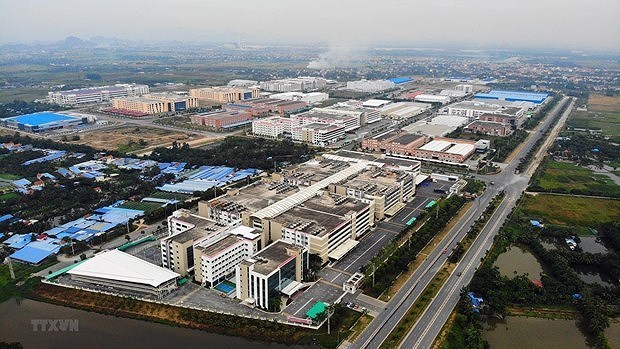The US-based newswire barrons.com has published an article annalysing positive impacts on Vietnam’s financial market of an infratructure development plan issued at the 13th National Congress of Communist Party of Vietnam.
 Illustrative photo (Source: AFP/VNA)
Illustrative photo (Source: AFP/VNA) The US-based newswire barrons.com has published an article analysing positive impacts on Vietnam’s financial
market of an infrastructure development plan issued at the 13th National Congress of Communist Party of Vietnam.
The article said
the leaders of the Communist Party of Vietnam (CPV) earmarking 119 billion USD for infrastructure and committing to increasing the private
sector’s contribution to the gross domestic product from 42 percent to 55 percent by 2025 have
attracted foreign investors and resulted in upbeat signals in the finnancial
market.
It cited an
example of the VanEck Vectors Vietnam exchange-traded fund, saying it is up 9 percent since the Congress wrapped on February 2. In addition, Dragon’s United
Kingdom–listed Vietnam Enterprise Investments fund has gained 17 percent this year.
Pouring cash into improvements should enable the government
to achieve its 6.5 percent to
7 percent annual growth
targets while boosting profits for appropriately positioned companies, said Bill Stoops, chief investment
officer at Dragon Capital in Ho Chi Minh City, as quoted by the article.
On the country’s
property potential, Nick Niziolek, head of global strategies at Calamos
Investments, was quoted as
saying that “New household formation in Vietnam is running at 80,000
to 90,000 a year, and supply at 60,000 to 70,000.” “That’s an exciting
long-term opportunity,” he added.
Regarding commercial
and digital infrastructure, it
quoted Sean Fieler, chief investment officer at Equinox Partners as saying that “Vietnamese engineers
cost less than in India, and thousands of them are learning Japanese.” According to him, FPT Vietnam, a diversified IT provider with a
burgeoning outsourcing business in Japan, saw its shares jumping by a third
this year and can run further.
With all the country’s positives, US investors might have
reason to edge back into Vietnam anyway, the article concluded./.